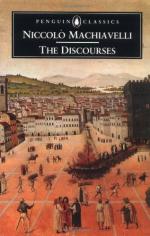
|
| Name: _________________________ | Period: ___________________ |
This quiz consists of 5 multiple choice and 5 short answer questions through Book Three, The Example of Rome's Great Men, Internal Security, Equanimity, Insurrection, Confidence, Electioneering, and the Tendering of Advice, Advice to Generals in the Field.
Multiple Choice Questions
1. How did Machiavelli report that the Nobles controlled the process of Plebes having the opportunity to choose Plebes for four Tribunes?
(a) They controlled the means of Plebes to provide for themselves.
(b) They were in charge of counting the votes.
(c) They began a war and had many Plebes sent to a foreign province.
(d) They offered choices between highly reputable Nobles and ignoble Plebes who asked to be considered for the positions.
2. How many commanders does Machiavelli advise over an army?
(a) One for each division.
(b) One for battle and one for negotiation.
(c) One.
(d) A tribunal.
3. According to Machiavelli, what was one negative consequence of the Roman Senate's decision to pay soldiers out of public money?
(a) So many Citizens joined the military that there were not enough to perform necessary jobs throughout the Republic.
(b) It raised taxes on Nobles.
(c) Soldiers began expecting regular pay raises.
(d) Rome was required to produce more currency to meet the payments, so the currency was devalued.
4. What does Machiavelli consider one of the most important reasons the Roman Empire was successful in expanding its borders?
(a) The Senate gave great authority to military leaders over Cities that Rome was attacking.
(b) It had laws that kept the Plebes in their place.
(c) It kept Citizens in poverty.
(d) It showed skill in placing Nobles in control over colonies.
5. What, according to Machiavelli, determines whether or not a Republic falls into tyranny.
(a) The weakness of its Princes.
(b) The corruption of its Nobles.
(c) The reputation of its Citizens.
(d) The absence of its military.
Short Answer Questions
1. Against whom are conspiracies made?
2. What does Machiavelli write will prevent a bad Citizen from working evil in a Republic?
3. How did Phillip of Macedonia avoid battles with Fabius Maximus?
4. Why does Machiavelli suggest wars should be quick with limited damage to the conquered City?
5. What does Machiavelli claim causes ingratitude from a conquered citizenry?
|
This section contains 448 words (approx. 2 pages at 300 words per page) |

|




